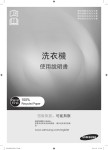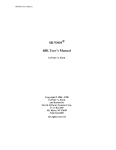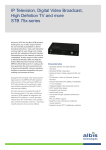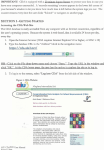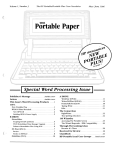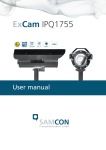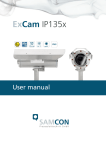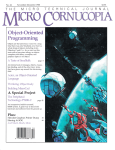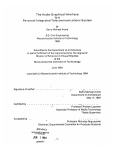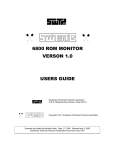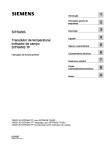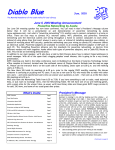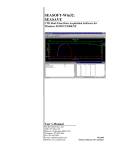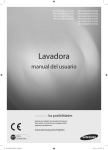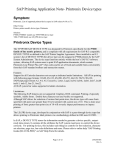Download SK*DOS/68K
Transcript
SK*DOS/68K
H
R
SPELL'N
FIX
SK*DOS
T
N
CHECK'N
TAX
'A
STAR-K
A
P
E
L
o
B
U
G
D
0
L,
WRITE'N
E
SORT
R
PLUS
HUMBUG
I
C
R
S
M
o
NEWTALK
E
R
F
I
X
E
SPELL
B
C
o
I
Z
A
2
B
COMMTERM
~@Q
!'ff,~
~~
~~®[J'c~@g
~~~
~l;7@
~
Star-K Software Systems Corporation
,
ir~~.
I~~~~~~~
P. O. Box 209
Mt. Kisco, New York 10549
Telephone: (914) 241-0287
BBS: (914) 241-3307
Fax: (914) 241-1537
ST AR-K QUALITY
The best judges of our products are our customers. Each of our software
manuals contains a User Registration form which asks for our customers'
comments on our programs. Here is what they write about our products:
"This is a very interesting piece of software. Keep up the good work."
P.H.,N.Y.
"I really enjoy Spell 'N Fix. It is very simple to operate. I will recommend the program to all my friends." C.J.K., CA
"We think your program is great. Do you have any others?" C.S., IL
"Great Program!" R.F., PA
"Excellent - Keep up the good work." D.D.M., NJ
"Without a doubt one of the best programs that I'll ever use!" B.M.,
Canada
"Works great!" R.M., CA
"The documentation is excellent." J.D., MA
"This is one of the handiest programs I have." T.N., IL
"Best monitor on the market!" J.S., LA
"The DlR command alone is wOlth the price!" L.O., IL
"Very nice piece of software. Does the job, good clear manual, and easy
to use." G.M., MO
"Excellent operating system." J.D., MA
"Good work. Excellent program!!!" L.S., CA
"I am very pleased with the performance of Spell 'N Fix." K.E., IL
"Outstanding program. "L.T., OH
"Impressive." K.M., MO
"Good program - Easy to use - Good manual." W.W., NV
"Intelligible user's manual! Congratulations." L.H., PA
"Works fine. It's actually teaching me to spell after 30 years of misspelling." K.G., MN
All product names in this catalog are trademarks of Star-K Software
Systems Corporation. We accept payment by cash, check, money order,
or COD. New York State residents please add appropriate sales tax on all
stock items; special order items for specific system configurations are
tax-free.
Call our BBS at (914) 241-3307 for information/support.
STAR-K Product Index
68000/68010/68020 Products
SK*DOS / 68K Disk Operating System . . . . . . . . . . . . . 2
SK*DOS Technical Characteristics . . . . . . . . . . . . . . . 4
Available SK*DOS Software . . . . . . . . . . . . . . . . . . . 8
PT68K-4 Computer . . . . . . . . . . . . . . . . . . . . . . . . 12
MS68K Computer System . . . . . . . . . . . . . . . . . . . . 14
HUMBUG System Monitor
. . . . . . . . . . . . . . . . . . . 16
6800/6809 Products
SK*DOS Disk Operating System. . . . . . . . . . . . . . . . . 18
STAR-DOS Disk Operating System . . . . . . . . . . . . . . . 18
STAR-DOS PLUS+ Disk Operating System. . . . . . . . . . . 18
HUMBUG System Monitor
. . . . . . . . . . . . . . . . . . . 19
SPELL'N FIX Spelling Checker . . . . . . . . . . . . . . . . . 20
Check'n Tax Accounting System . . . . . . . . . . . . . . . . 21
Remotelm / Commterm / Eliza / Shrink / Newtalk. . . . . . . . 22
Educational Products
Numerical Methods Course . . . . . . . . . . . . . . . . . . . . 23
68000 Hardware Course . . . . . . . . . . . . . . . . . . . . . 23
1
SK*DOS®/68K Disk Operating System
SK*DOS/68K is a single-user disk operating system for computers
using Motorola 68000 family microprocessors. It is ideal for applications
in
a Industrial Control
a Business Use
a Educational Computing
a Scientific Computing
a Number Crunching
a Dedicated Systems
a Turnkey Systems
a Data Collection
a Single-Board Computers
a Bus-Oriented Computers
a Graphics Workstations
a One-of-a-Kind Systems
a Advanced Hobbyist Use
SK*DOS/68K is available either already configured for various systems
(such as those on the following pages), or in a generic version which is
easily adapted to run on a variety of other systems from 32K up to many
megabytes.
SK*DOS has been adopted by several manufacturers as the DOS of
choice for their systems, and is cUlTentIy running on a wide range of
systems, from small 68008 computers up to full-blown 68020 systems.
SK*DOS/68K comes with over 40 commands and system programs,
including an editor, assembler, Basic, 6809 emulator, RAMdisk, disk
cache, and utilities to read and write MS-DOS disks, copy-by-date,
undelete, show differences between files, prompted delete, text file
browse, and more.
SK*DOS is written to let you easily access the advanced features of the
68000 processor. For example, a simple program in assembly language
to print out your name may take a page or two on other 68000 systems; it
takes only six lines under SK*DOS.
Languages and other software, available from other vendors and
through public domain sources, include compilers (C, Modula-2, and
Whimsical), a full Basic, screen editors, disassemblers, spelling checkers,
text fOlmatters, music editors, hard disk managers, and communications
programs.
2
SK*OOS/68K (continued)
SK*DOS Features:
a
a
a
a
a
a
a
a
a
a
a
a
a
a
a
a
a
a
a
a
a
a
a
a
Full DOS documentation plus on-line help
Multiple directories
User-installable device drivers
Install up to 8 different I/O devices
Keyboard typeahead
Print-Screen
Virtual (RAM) disk
Disk Cache
Up to 10 drives
5-1/4" and/or 3-1/2" floppy drives
Hard drives to 64 megabytes each
I/O redirection to files or I/O
Time/date stamping of files
File or disk write protect (even hard disk)
Batch files
Support for 68000, 68010, 68020 processors
Monochrome or video board SUppOlt
Read and write MS-DOS files
User support via newsletter and BBS
6809 Emulator included
Simple Basic included
Fast assembler included
Line editor included
User-fiiendly prompts; includes undelete
SK*DOS/68K Prices
SK*DOS is available for single-copy or dealer sales, as well as OEM
licenses. Single copies cost $75; the optional Configuration Kit for
adapting to new systems costs an additional $25. SK*DOS is also available bundled with various 68000 systems at very attractive prices contact us for details.
3
SK*OOS/68K (Continued)
Overview
SK*DOS/68K is a single-user disk operating system for computers
using Motorola 32-bit CPUs such as the 68008, 68000, 68010, and 68020.
Although SK*DOS/68K contains quite a variety of advanced features,
these are totally transparent to a beginning user, and are not necessary for
actual use. They are there for those who want them.
System Compatibility
SK*DOS/68K can be used in systems from as small as 32K up to 16
megabytes or more. To date, it has been configured for 68xxx systems
made by
a Data-Comp Inc.
a Dominic E vans Industries, England
a Emerald Computers Inc.
a Hazelwood Systems
a Marion Systems
a Micro Concepts, England
a NCR
a Peripheral Technology
a Ralph Allen Engineering, England
a VCS Computer Systeme GmbH, Gennany
and others. Some of these versions are available from us, others are
supplied by the equipment manufacturers. In addition, a number of other
manufacturers are using SK*DOS in embedded applications such as data
collection or machine control. A do-it-yourself 68000 computer project
using SK*DOS was featured in a series of mticles beginning in the
October 1987 issue of Radio-Electronics Magazine.
There is a 'generic' version of SK*DOS which is user-configurable for
other computers. This version includes a Configuration MmlUal, which
describes how to implement SK*DOS/68K on a new system. It comes
with a disk with source code for the terminal and disk drivers, boot
program, disk format utility, and other valuable infonnation. Builders of
small systems will be especially interested in the source code for 68K
HUMBUG, a boot ROM which provides for system startup and debugging while adapting SK*DOS for new systems. The disk is available in
either SK*DOS format or in IBM PC fonnat.
4
SK*OOS/68K (Continued)
Technical Data
SK*DOS/68K is set up so that it defaults to a very simple system unless
the user specifically calls its more advanced features. Some of these
include multiple direct0l1es, I/O redirection, batch files, RAMdisk, disk
caches, hard disks, time-stamping, etc. User-written device drivers are
easily installed to provide customization to different terminals or other
I/O devices.
To lUn SK*DOS/68K, a computer requires a minimum of 32K of RAM,
with 128K or more being preferred. But the old maxim of 'the more, the
better' certainly holds.
Although SK*DOS is not relocatable, we can provide it at a variety of
different memory addresses on special order (and it is therefore also
potentially ROMable). Since most 68000 computers will have RAM
beginning at address $0000, the most likely memory configuration will
look as follows:
$0000 - 03FC Trap and interrupt vectors
$0400 - OFFF Boot routines and stack space
$1000 - 7FFF (approx) SK*DOS/68K
$8000 to end of memory - available to user programs
This is just one possible configuration; different configurations are
possible for systems which lack available memory beginning at $0000.
All memory above SK*DOS/68K is available for user programs and
utilities. It is relatively easy to implement TSR (Terminate and Stay
Resident) programs; for example, SK*DOS/68K is supplied with a RAM
disk program which can reserve 16K or more of memory as aRAM disk.
This program and its data area would nOl1llally be loaded once and then
stay in memory above SK*DOS; SK*DOS maintains memory pointers
which define the bottom and top of free memory.
Unlike SK*DOS/68K itself, disk-resident commands (such as CAT or
LIST), as well as user-written programs, are written in position independent code. When executed, these are loaded by SK*DOS/68K into the
free space above SK*DOS/68K itself (and above any TSR programs that
may have been previously loaded.) Hence such user programs and utilities
will run in any SK*DOS/68K system, even one where SK*DOS/68K has
been located at some other address.
Since SK*DOS/68K may not lie in the same place on all systems, user
programs must be position independent. Moreover, all calls to
SK*DOS/68K, as well as all references to SK*DOS/68K variables, must
also be position independent. Hence all such calls are through exception
5
SK*OOS/68K (Continued)
vectors, and all references to SK*DOS/68K vmiables are through relative
addressing.
For assembly language users, SK*DOS comes with an equates file
which allows all system variables and functions to be called by their
symbolic names. Using this method, DOS calls become simple DC
commands. For example, instead of calls such as INT 16h, which are used
in 8088 systems, SK*DOS uses calls such as DC SWRITE to write a
sector, DC FOPEN to open a file, or DC OUTCH to output a character.
When used with a system ROM such as HUMBUG, SK*DOS allows
convenient debugging of programs under development. A TRACE command in SK*DOS allows a program to be loaded and then entered in trace
(single-step) mode. The ROM debugger then takes over and permits
tracing or breakpointing.
Combined with the simple user interface, this makes it very convenient
to use the 68000 for CPU-intensive applications.
SK*DOS Functions and Commands
SK*DOS/68K is provided with a full complement of utilities, including
those needed to format, copy, backup, mId test disks; display disk contents; build, list, append, rename, or delete files; and change system
parameters. This includes the obvious utilities like COpy, CAT, RENAME or DELETE, as well as utilities which depend on specialized
hardware, such as TIME, HDFORMAT, or PARK.
SK*DOS/68K is also supplied with an editor, a full 68000 assembler,
and a (somewhat limited) Basic language interpreter, which allow you to
immediately get started lem·ning the power of SK*DOS. Other programs
and utilities are supplied to make SK*DOS more convenient or to speed
up its operation. The RAMDISK commmld allows you to set up a RAM
disk up to 1 megabyte in size; the CACHE command sets up a disk cache
which tremendously speeds up access in floppy - based systems. UNDELETE permits files to be retrieved, sometimes as long as days or weeks
after they have been deleted. REDOFREE permits disk space to be
compacted or compressed to speed up disk access.
A rather unique utility is SK*DOS09. This is a complete 6809 SK*DOS
and a 6809 emulator program. It allows you to run standard 6809 programs
on your 68K system (although they do run at reduced speed). For those
users who have a substantial base of 6809 software (using either 6809
6
SK*DOS/68K (Continued)
SK*DOS or 6809 Flex), this allows them to run such popular programs
as 6809 editors, spreadsheets, assemblers and cross-assemblers, word
processors, compilers, and more.
Like its 6809 predecessor, SK*DOS/68K contains program-callable
functions to do file maintenance; open, read, write, and close sequential
and random files; read and write individual sectors; access the disk
directory; input and output characters, strings, and numbers; process
command line arguments; parse file names; report en'ors, and more.
SK*DOS/68K has also been designed to make expansion easy. A
standardized system of calling disk and terminal drivers makes it possible
to add additional device drivers without great complexity. SK*DOS/68K
supports up to ten logical disk drives, so a system can contain as little as
one dtive (plus perhaps a RAM disk), or as many as ten drives. Furthermore, the DEVICE and DRIVE commands allow I/O devices and disk
drives to be reassigned as needed, so additional devices and drives can be
brought in as needed.
Depending on the available hardware, SK*DOS can support floppy
disks up to 16 megabytes in size, and hard disks up to 64 megabytes. Hard
disks can be partitioned into up to four partitions. Files as well as entire
disks can be software write protected.
SK*DOS/68K supports I/O redirection from the command line, using
the < and> symbols as in Unix or MS-DOS, to either disk files or I/O
devices. It also supports batch files, and batch files can call other batch
files. In addition, application programs can pass a command line to
SK*DOS as if it came from the console and have it executed. Combined
with the fact that it is easy to reserve memory for resident programs, this
makes it easy to add an alternate command processor or shell which totally
changes the user interface.
Files written to disk normally contain the file creation or last modification date. In addition, each file entry may also contain a creation or
modification time if the system contains a clock/calendar IC. If such
hardware is not available, then SK*DOS/68K defaults to sequentially
numbering files each day, and records the sequence number rather than
the lime. Disk catalog utilities are provided which list disk contents either
in the order on the disk, in alphabetic order, in order by date and time, or
in order by date and sequence number; the latter two show the latest files
first.
7
SK*OOS/68K (Continued)
Available Software for SK*OOS/68K
The following partial list of SK*DOS software is coded as follows: UG
CSC = Computer Systems Consultants Inc.;
PB = Palm Beach Software; SS = Spray Software; MC = Micronics
Research Corp.; SKD = Supplied with SK*DOS System disk; BBS =
Available for downloading from the SK*DOS BBS at (914) 241-3307;
ME = Michael Evenson BBS at(817) 488-8398; OU = Other Users.
= SK*DOS Users' Group;
ACAT - Plint alphabetized disk catalog (SKD)
APPEND - Append two disk files (SKD)
AREA CODE - Finds telephone area codes (UG)
ASCII - Convert keypress into its ASCII code (SKD)
ASM - 68000/68010 Native assembler (SKD)
ASMK - Fast 68000 Assembler (PB)
ASMxx - Crossassemblers for Z80. 8048, 8085, many more (CSC)
BACKUP - Make a backup of a floppy disk (SKD)
BEEP - Add a beep to system prompt (SKD)
mGCAL - Plints a big calendar (UG)
BUILD - Generate short text files without an editor (SKD)
C - Full K&R Compiler (UG or CSC)
CACHE - Cache program to speed up floppy disk operation (SKD)
CAL - Prints a calendar (UG)
CALLS - Does analysis of function calls within a C program (UG)
CAT - Print disk directory with additional data (SKD)
CCHECK - Check a C program indentation and comments (UG)
CHECKSUM - to checksum of disk contents (SKD)
CMODEM - Modem program for communications (UG)
CMON - Debugging monitor (OU)
CMP - File compare program by Jim Hughes (UG)
COMPAR - Compare two files (UG)
COMPARE - Compare two complete disks (SKD)
COPY - copy one or more files between disks, with options (SKD)
CURSOR - Adjust cursor type (OU)
CUT - Cut out columns from text files (UG)
DAMON - Display drive/track/sector for each disk access (SKD)
DELETE - Delete a file from a disk (SKD)
DEVICE - Install a new I/O device on system (SKD)
DIFF - Display differences between two text files (SKD)
8
SK*DOS/68K (Continued)
DIRS - Display CUITent directories on a disk (P K MOITison / BBS)
DIS - 68000/68010 Disassembler (UG)
DISKEDIT - Examine and edit disk files (UG)
DISKNAME - Display or change name or date of disk volume (SKD)
DOSPARAM - Display or change CUITent DOS or device parameters
(SKD)
DRIVE - Install or change active system drives (SKD)
ECHO - Echo command line with hex/octal/etc (from Unix) (UG)
EDDI - Screen Editor (PB)
EDLIN - Simple line editor (SKD)
ED - Screen editor, written in C, available in source (UG)
EDX ~ Unix "ED"-like line editor (UG)
ELIZA - Popular psychiatrist simulator game (SKD)
EMACS - Editor based on Micro Emacs (from Unix) (UG)
EZMODEM - Screen-oriented modem communications program (ME)
FDUMP - Hex file dump program to examine disk files (UG)
FIND - Find a text string inside a file (SKD)
FORMAT - Format a floppy disk (SKD)
FROMSDOS - Import a file from MSDOS to SK*DOS (SKD)
FTOH - Copy an entire floppy disk to a hard or RAM disk file (SKD)
FUNIQ - Remove duplicate lines from non-sorted file (does not sort)
(UG)
GREP - Find strings within a file (from Unix) (UG)
HDFORMAT - Format a hard disk (SKD)
HECHO - Hex Echo program by Jim Hughes (UG)
HELP - Provides instructions to user on how to use SK*DOS (SKD)
HERC - Driver for Hercules monochrome board, emulates TVI
(UG)
HTOF - Opposite of FTOH above (SKD)
lOST AT - Show I/O equipment cUlTently recognized by system (SKD)
JINK - Relocatable Loader (OU)
KRACKER - 68000 file-to-file disassembler, text can be reassembled
(PB)
LINK - Prepare a floppy disk for booting (SKD)
LIST - Display contents of a disk text file (SKD)
LOCATE - Display load addresses of a binary file (SKD)
LOGIC - Schematic drawing program (PB)
noc
9
SK*DOS/68K (Continued)
LONGSIDE - Pl1nts two files side-by-side for comparison (VO)
LS - Similar to LIST command (from Unix) (UO)
MAKEMPTY - Oenerate an empty data file (SKD)
MEMTEST - Memory test program (UO)
MICRO-SPELL - Spelling checker (UO)
MODULA-2 - Compiler soon to come
MOZART - Music composition program (PB)
MSDIR - Display directory of MSDOS disk (ME, BBS)
MSREAD - Read an MSDOS disk (ME, BBS)
MSWRITE - Write an MSDOS disk (ME, BBS)
NCB - C beautifier program to restructure a C program (UO)
NOBEEP - Opposite of BEEP above (SKD)
NRO - "Runoff'-type text processor (from Unix) (VO)
PAGE - Unix-like program to page through a text file (UO)
PARK - Park a hard drive before shutting it off (SKD)
PASTE - Paste data from multiple files together (UO)
PA T - Screen Editor (OU)
PDELETE - Prompted delete utility (SKD)
PEEK - Allow examining memory from SK*DOS command line (SKD)
POKE - Allow changing memory from SK*DOS command line (SKD)
POSITION - Position cursor on line (Frank Neuner 1BBS)
PPR - Page printer program to format output to printer (UO)
PR OMPT - Change SK*DOS prompt (SKD)
PROTECT - Change file attributes to delete protect etc. (SKD)
RAMDISK - Set up a RAM disk to speed up system (SKD)
RBASIC - Full Basic Interpreter (MC)
READ - Browse through text files backwards and forwards (SKD)
REDOFREE - Display disk parameters and rearrange free space (SKD)
RENAME - rename a disk file (SKD)
REPLACE - String replacement program (VO)
S4SKDOS - converts S4/S3 records to .com file (VO)
S4LOAD - convert S4/S3 records binary, for EPROM programmer (UO)
S4UNDOS - converts .com file to S4/S3 format file (UO)
S4UNLOAD - converts a binary memory image to S4/S3 (UO)
SC - Small C compiler (available in source and object) (VO)
SCAT - Sequenced catalog utility (SKD)
10
SK*DOS/68K (Continued)
SCSIEVE - Sieve program for testing C compiler (UG)
SE - Screen editor (UG)
SEQUENCE - Change sequence number (for systems without clock)
(SKD)
SFIND - String find program (UG)
SHAR - Archive program for combining files for transmission (UG)
SINSTR - Another version of SFIND (UG)
SKCC - C Compiler (CSC)
SLEEP - Time delay program for batch files (Frank Neuner / BBS)
SORT - Sort a file by various fields (UG)
SPELLB - Spelling Checker (PB)
STEPRATE - Change default drive steprate time (SKD)
STONES - Awari-type game (UG)
STRINGS - Find text strings in text or command files (UG)
SUBCAT - Subdirectory Manager (PB)
SYSTEM - Change or display cunent system default drive (SKD)
TCAT - Display disk catalog with latest files on top (SKD)
TIME - Display or set clock/calendar setting (SKD)
TMODEM - Modem program for Xmodem protocol (from Unix) (UG)
TOLOWER - Change upper case files to upper/lower case (SKD)
TOMSDOS - Export files from SK*DOS to MSDOS (SKD)
TRACENAB - Set up a program for tracing (SKD)
UBASIC - Basic language interpreter (SKD)
UNCOMPR - uncompress an LZ compressed file done with compress
(UG)
UNDELETE - Bring back a deleted file (SKD)
UNIQ - Delete duplicate lines from a sorted file (UG)
UNSQCMPR - Compare two text files for differences (from Unix) (UG)
VERIFY - Turn disk verify on or off (SKD)
VERSION - Display version number of a command file (SKD)
WC - Word count program (from Unix) (UG)
WHIMSICAL - Structured language compiler (SS)
WORK - Change or display cunent work default drive
XARC - File uncompress program (ME)
XREF - create a cross reference listing of a program file (C, asm, etc)
(UG)
YASE - "Yet Another Screen Editor" (aU)
11
THE PT68K-4 / SK*DOS 68000 COMPUTER
The PT68K-2 68000 Computer is a high performance, low cost singleboard computer designed for industrial and educational applications. It is
available as a kit, as a semi-kit, as an assembled printed circuit board, or
in complete systems.
The unique feature of the PT68K-4 is that it is designed to be physically
and electrically compatible with an 'XT-style' motherboard. It fits into
the same cabinet, takes the same power supply and keyboard, and its six
XT -compatible I/O connectors accept the same expansion cards, such as
monochrome or color video boards and hard disk controllers.
On-board is up to 4 megabytes of DRAM, four serial ports, two parallel
ports, two floppy disk controllers, clock/calendar chip, programmable
timers, and more. Additional IIO inteifaces may be plugged into its seven
PC/XT-compatible I/O connectors. Teamed with SK*DOS to provide
floppy and hard disk support,
RAMdisk and disk cache. and
other advanced features, the
PT68K-4 offers poweiful68000
computing, in kit or wired form,
at a very attractive price.
Complete systems mount in an
XT-sized 'baby-AT style' cabinet with a ISO-watt switching
power supply. The cabinet includes an LED display panel
monitoring power, disk activity,
and 'HALT' status. The cabinet
has space for four half-height
floppy or hard disk drives.
The system is operated from an
external full-size keyboard and
video display. You may use an
RS-232C terminal, or any computer having a terminal-emulator program (using the serial interface on
the system board). Alternatively, you may use an IBMXT/AT-compatible
keyboard and either a monochrome or color video display board and
compatible monitor (plugged into the expansion connectors on the system
board).
Two floppy interfaces may be mounted on the system board, or an
inexpensive external hard disk controller may be used. The PT68K-2
12
PT68K-4 Computer (Continued)
supports the PC/XT-compatibIe Western Digital MFM controller card
such as the WDl002-WX2 or WDlO02-GEN, which will plug into one
of the IBM-compatible I/O slots. Any ST506- or ST412-compatible hard
drive up to 64 megabytes can be used; the hard drive format program
prompts for drive parameters.
The PT68K-4 is supplied with HUMBUG and a small Basic in ROM,
which allows operation of even a minimal system, and supports keyboard
and video output. (See the HUMBUG description on page 16).
Prices depend on current DRAM prices and are therefore subject to
change. In general, PT68K-4 prices range from $220 (for a minimal 12
MHz kit which includes static RAM and all components to execute
HUMBUG and Basic, but no dynamic RAM, clock, parallel or expansion
ports, and floppy interface), up to approximately $489 for a 16 MHz 512K
kit which includes the above components and SK*DOS. The minimal kit
can be expanded to a full system by simply installing the extra components
on the printed circuit board. Assembled versions are also available.
SPECIFICATIONS
Processor
Clock speed
Size
Power Supply
DRAM
SRAM
EPROM
ROM monitor
Serial ports
Parallel ports
Floppy interface
type
number of drives
disk capacity
Clock/calendar
Interrupt timers
Expansion
Operation
68000
12 MHz or 16 MHz
12" L x 8.5" W (fits in XT cabinet)
Connector fits XT-style power supply
512K to 4 Meg (no wait states)
4K to 64K (optional battery back-up)
32K, 64K or 128K
HUMBUG® included
4 (using two MC68681 DUARTs)
2 (using MC68230), usable for printer
2 on motherboard
either WD 1772 or WD37C65
1 t04
360K to 1.4 Meg per drive
on board (with battery)
2
7 PC/XT-compatible I/O connectors
1 memory expansion connector
via serial terminal or PC keyboard/video
13
MS68K / SK*DOS 68000 COMPUTER
The MS68K Single Board Computer isa complete 68000 system on a
53/4" by 8" board which can mount on a 5lJ4" disk drive. It supports up to
5I2K of zero-wait-state DRAM, up to 128K of EPROM, two serial ports,
a parallel port, an expansion bus, a built-in floppy disk controller, and an
optional SCSI controller for controlling an external hard disk interface.
Memory Expansion boards are available for up to 12.5 megabytes of total
RAM.
Because of its compact size and reliable construction, the system is ideal
for either software development or control applications. It includes a
ROM monitor for debugging, and runs the SK*DOS disk operating
system.
In normal use, the system is operated from a serial terminal (or any
computer having a tenninal-emulator program) via one of the serial ports.
Teamed with SK*DOS, the system provides floppy and hard disk support,
RAMdisk and disk cache, and other advanced features, at a very attracti ve
price and form factor. It offers a very popular vehicle for 68000 software
development.
14
MS68K Computer (Continued)
The MS68K is priced at $375 with 128K DRAM. Options include the
SK*DOS operating system (with editor, assembler, Basic, etc.) at $70;
DRAM expansion to 256K at $75; and the SCSI controller at $15.
SPECIFICATIONS
CPU
Board size
Clock speed
DRAM
ROM
Serial ports
Parallel port
Floppy disk controller
tracks
sides/density
disk capacity
SCSI Port for hard drive
Hard drive size
68000
53/4 x 8" (fits on 5lf4" disk drive)
8 MHz (zero-wait-state RAM)
128K, expandable to 512K
32K debugger, expo to 128K
2 (MC68681), to 38.4 kilobaud
1 (printer port)
Included (1772)
35 - 80
single or double
to 720K per drive
5380 controller (optional)
to 64 megabytes
HARDWARE PRICING
The following table shows comparative pricing for several typical
68000 systems; please keep in mind that the rapid fluctuations in DRAM
prices may require some minor changes in system prices, so contact us
for the current price before ordering. All prices shown are for the main
printed circuit board assembly only; additional parts, such as cabinets,
power supplies and disk drives are required to complete a system.
MS68K (wired with 128K)
MS68K (wired with 256K)
MS68K (wired with 256K and SK*DOS)
PT68K-4 (12 MHz minimal kit, no DRAM)
PT68K-4 (16 MHz kit with 512K DRAM, SK*DOS etc.)
PT68K-4 (wired with 1 meg DRAM and SK*DOS)
PT69 (USED, wired 6809 system with 64K and SK*DOS)
$375
$450
$525
*
*
*
$325
Other systems are available; * contact us for details.
15
In order to operate, every 68K system needs a system monitor in ROM.
This monitor program contains the very first instructions performed when
the computer is first turned on. It performs the basic initialization of the
system which is required to allow it to work, and becomes the 'monitor'
which oversees the direct operation of the hardware - at least, until such
time as you boot a DOS or other application program. The HUMBUG
monitor performs that function.
Specifications
HUMBUG responds to two-letter commands from the keyboard. Although there are slight variations between versions, most versions implement the following commands:
AD
Formatted ASCII dump.
AI
ASCII Input.
AO
ASCII Output.
BP
PIint Break--points.
BR
Brealq)oint set/reset.
CO
Continue.
CS
Checksum.
FD
Boot SK*DOS from floppy disk.
FI
Find.
FM
Fill memory.
HA
Hex and ASCII dump.
HD
Hex Dump.
HE
Help.
JS
Jump to System program.
JU
Jump to User program.
LO
Load S 1 - S9 binary format
MC
Memory compare.
ME
Memory examine and change.
MO
Move memory.
MS
Memory Store.
MT
Memory Test.
RC
Register Change.
RD
Return to SK*DOS.
RE
Register Examine.
SS
Single-step.
ST
Start single-stepping.
16
HUMBUG/68K (Continued)
Specifications (continued)
WB
Winchester disk boot.
!!
Monitor reset command.
To provide a convenient programming interface, HUMBUG also contains a number of entry points for routines which may be used by user
programs. These include the following:
COLDST
Cold start
WARMST
Warm start
INEEE
Input 7-bit char to D5, echo (current device)
INCH7
Input 7-bit char to D5, no echo
INCH8
Input 8-bit char to D5, no echo
INCHEK
Check input device status, return NZ if has char
OUTCHX
Output char from D5, no control-S check
OUTEEE
Output char to current device, control-S check
OUTCHM
Output char to serial port (DUART lA)
Output char to serial printer (DUART lB)
OUTCHP
OUTCHB
Output char to monochrome video board
PSJRNG
Print string pointed to by A4
OUT4HS
Output 4 hex digits from D4
OUT8HS
Output 8 hex digits from D4
OUTCHC
Output char to color video board
INCH 16
Input 16-bit extended char to D5, no echo
CHEK16
Check extended char status, return NZ if has char
Prices
Since HUMBUG directly controls the I/O hardware of the system, it
must be customized to the specific system it is to run on. It is currently
available on several computer systems (such as the PT68K-4), already
configured and installed in an EPROM. In such systems, the price of
HUMBUG is already included in the system price.
HUMBUG is also available in a generic source-code version, usable for
adaptation to new systems. A source-code version is also supplied with
the SK*DOS Configuration Kit. In both forms, the price is $100. The
source code is contained on a floppy disk, available in SK*DOS, MSDOS, or Flex format.
HUMBUG is also available for OEM licensing at attractive terms;
contact us for additional information and prices.
17
6809 Disk Operatin~systems
6809 SK*DOS
SK*DOS is a single-user disk operating system for 6809 based computers such as the Elektra, SWTP, Gimix, Hazelwood, and others, including
many of the 6809 single-board computers such as the PT-69 from Peripheral Technology. It is a very much simplified version of our
SK*DOS/68K, described on earlier pages, but for users who do not need
the full power of a 68K system.
SK*DOS was originally designed to run all the same programs which
run with Flex from Technical Systems Consultants. There is a wide variety
of software available, including Basic, editors, assemblers and cross-assemblers, sort-merge, text processors and formatters, compilers for Pascal, C, and Basic, modem programs, spell checkers, etc.
It is available in several variations (depending on your hardware), and
is also supported by other manufacturers.
Individual copies of SK*DOS cost $75; a Configuration Manual is
available for $25.
STAR-DOS ™
STAR-DOS is an earlier version of 6809 SK*DOS, designed to run on
a Color Computer I or II. It uses the same disk format as Radio Shack
DOS uses, but it is programmed and behaves like SK*DOS. In fact, on a
64K system, STAR-DOS will run many Flex or SK*DOS programs
without change, which explains why other software vendors have licensed
STAR-DOS to aid in porting their own software to the CoCo.
STAR-DOS can run on any CoCo I or II system from 16K up, and costs
$34.95.
ST AR-DOS PLUS+ ™
STAR-DOS PLUS + is a version of our 6809 SK*DOS, adapted by
Data-Comp Inc. of Hixson, Tennessee, for the Color Computer.
STAR-DOS PLUS+ runs Flex and SK*DOS/6809 programs, uses the
same disk format, supports single or double density, single or double sided
disks, etc. It adheres closely to the 6809 SK*DOS implementations on
larger 6809 systems.
STAR-DOS PLUS + comes with the same detailed user's manual as our
larger systems, and costs just $34.95 (Sony - STAR-DOS PLUS+ is not
available for the Color Computer III.)
18
6800/6802/6809 HUMBUG@
If you do any kind of programming in machine or assembly language,
or if you would like to learn how your computer works intemally, then
you need a monitor program like HUMBUG. It is the ultimate monitora complete debugging system that is unquestionably the best.
Every larger 68xx(x) system has a monitor program in Read Only
Memory (ROM), and we have been supplying HUMBUG for those
systems for years. As a bare minimum, a monitor should allow you to
examine and change the contents of your computer's memory, and start
a program. In fact, some monitors do only that! But HUMBUG is
different. Not only can you start programs, you can also perform them just
one step at a time, or you can insert breakpoints which let you perform
entire sections of programs at a time. You can load and dump memory in
various fonnats, including (on 6800 and 6809 systems) an instruction-byinstruction formatted display which lets you see and understand programs
like never before. You can switch I/O devices on and off, fill and move
memory, check memory and its contents, and more. And, as a special
feature, the HUMBUG manual contains not just full instructions on its
use, but a complete listing of HUMBUG as well. Examining this listing
is educational in itself, since the best way to learn a new language is to
see how other people use it.
The versions identified with * below are stock items; others are made
to order after you specify your exact system configuration. (Before
ordering one of the unstarred versions listed below, we suggest that you
contact Star-K for infonnation on versions and options available.)
* CoCo{TDP-lOO 16K to 32K, disk or cassette
* Dragon 16K to 32K, disk or cassette
* Disk for STAR-DOS, SK*DOS, or Flex systems
* Cassette for the MC-lO Micro Computer
* 4K ROM for Peripheral Technology PT-69
4K ROM for SWTP or similar SS-50 6809 systems
3K ROM for Percom SS-50 6809 systems
4K ROM for SWTP or similar SS-50 6800 systems
2K ROM for SWTP or similar SS-50 6800 systems
2K ROM for Star-K SBC-02B computer
2K MICROBUG (Reduced version of HUMBUG for
Elektra or SWTP-compatible systems)
68000/68008/68010/68020 versions - see pages 16-17
$39.95·
$39.95
$59.95
$29.95
$75.00
$75.00
$65.00
$65.00
$45.00
$45.00
$25.00
19
SPELL 'N FIX II
Spell 'N Fix II finds and fixes spelling and typographical errors in your
text files, so your pIinted output looks and is perfect. Completely menu
driven - even a child can do it.
Spell 'N Fix II is a joy to use. As it proofreads your text, it shows the
text (in full upper and lower case) on the top part of your screen, while
looking up every word in its dictionary. When a suspect word is found,
you see it in context as part of the text, and Spell 'N Fix II asks you what
to do with it. You then decide - let it pass, add it to the dictionary, fix it,
or look it up in the dictionary. If the correct spelling is there, you can
substitute it with just two key strokes and go on.
Spell 'N Fix II comes with a 20,000+ word dictionary which has been
carefully compiled from words commonly used; in addition, you may add
your own favorite words (such as names, addresses, or special technical
or even foreign words). Spell 'N Fix II requires a minimum of 32K
memory and at least one disk drive, and light now is only available for
the Color Computer.
SHAREWARE
SPELL 'N FIX II is a "shareware" program. We will send you a disk
with Spell '11 Fix II for $2. Try it out for 30 days; if you find it useful, then
we ask that you register your copy for $25, and we will send you the full
manual and registration. Or send $50 and receive a larger, 40,000-word
dictionary as well.
SPELL 'N FIX
The Original Spell 'N Fix is still available for 6800 and 6809 DOS users,
and for CoCo users who do not have disk. The tape version finds errors
in your text file and displays them on the screen or printer. Disk versions
also add valid words to the dictionary, and correct words in the text file
as well.
Color Computer (without disk)
$49.29
6809 STAR-DOS, SK*DOS, STAR-DOS PLUS+ or Flex
$49.29
6800 Flex 2.0 or Miniflex
$49.29
Percom 6800 DOS
$49.29
Color Computer OS-9 (XSPELL)
$49.95
20
CHECK 'N TAX
It's difficult to explain CHECK 'N TAX in just a few short words, but
we'll try. It is a package of eleven programs which maintain four data files
which contain information about checks you write and bills you pay. At
any time you can print out data in the files, either completely or by type
of expense, or search for specific items. The files are standard sequential
files, so if for some reason you want to add, delete, or change information
or edit it in any way, any standard editor or word processor will do it. At
the end of the year, CHECK 'N TAX can print a yearly summary of
expenses by category. CHECK 'N TAX supports up to 99 categories of
your own choosing, and any check or other item can be assigned to up to
two categories.
How does the data get into the files in the first place? In one of two ways.
First, items such as bills, receipts, or even income items can be entered
simply by typing them at the keyboard; one of the CHECK 'N TAX
programs is called ADDITEMS and is used just for that.
Checks can be entered that way too, but a better way is to use the
checkbook balancing part of CHECK 'N TAX. There are other checkbook
balancing programs available, but most of them just use an expensive
computer to do what a cheap calculator could do better. Not CHECK 'N
TAX - it contains two programs called BALANCEI and BALANCE2
which are quite unique. They do a complete cross-check between the
actual checks, what your checkbook stubs say about those checks, and
what the bank says about them. Any differences get identified - fast. They
also maintain a monthly file of outstanding checks and deposits; this is
done automatically so you never have to check off checks on your stubs,
or search to see whether a particular check has come back from the bank
or not. Each month, you get a complete printout of what checks or deposits
are still outstanding, and any differences between what you think your
account should have, and what the bank thinks you have. In short, you
know exactly where you stand at all times.
CHECK 'N TAX is available for Coco disk systems (using Radio Shack
disk Basic) or for SK*DOS, STAR-DOS, or Flex (using TSC Extended
Basic or RBASIC). It is also available for 6800 systems using Percom,
MiniFlex, or Flex 2.0 DOS. The cost is $50 for any version.
21
REMOTERM
REMOTERM lets you operate your Color Computer through its serial
RS-232C port. If you connect a terminal (or another computer which is
running a communications program such as COMMTERM), you can run
programs on your computer from this remote keyboard. The terminal can
be right next to your computer, or it can be far away, linked through a
modem. Sitting at the remote tenninal' s keyboard, you can start and stop
programs, load or save programs on disk or cassette, and more.
There is a catch. REMOTERM only runs with Basic programs, and it
does not support graphics, PRINT AT statements, or the INKEY$ command. Except for these limitations, it is extremely versatile and can be
used for uploading or downloading files, remote control, and even bulletin
boards. It is available for the CoCo lor II, and costs $19.95 on disk or
cassette.
COMMTERM
COMMTERM is a simple communications program for the Color
Computer or the MC-IO Micro Color Computer. COMMTERM allows
you to use your computer a<; a tenninal to another computer.
Commtenn is a "shareware" program. We will send you a disk with
Commtenn for $2. Try it out for 30 days; if you find it useful, then we ask
that you register your copy for $10.
ELIZA/SHRINK
A version of the popular Eliza game, available for the Color Computer
or for 6800 or 6809 systems running SK*DOS or Flex. $15 on disk or
cassette.
NEWTALK
A speech program for the Color Computer, talks through the TV
speaker. A cute demonstration program, designed mainly for machine
language experimentation. NEWTALK reads out the hexadecimal contents of memory in English, so you can compare what you entered with
what is actually in memory. $15 in disk or cassette.
22
EDUCATIONAL PROGRAMS
NUMERICAL METHODS
This is a college level course on a subject that is required in almost all
engineering schools and computer science cunicula. Although computers
can do simple arithmetic operations such as adding or subtracting, they
cannot directly solve for the roots of equations or do some of the more
elementary operations from calculus. This is where Numerical Methods
comes in - this is the study of how to do these more complicated
operations on a typical computer. Our Numerical Methods course includes a 300+ page textbook (which is actually used in many colleges and
universities), a disk or cassette with programs to run to tryout each of the
techniques described in the text, and course notes which list each program
and describe it.
This is a college level course, and knowledge of algebra and calculus is
required to understand the course. But it is written in a very clear style
and should present no undue difficulties. The course is available for the
CoCo as well as other 6800,6809, and 68K systems, and MS-DOS and
costs $75. All versions are in Basic, and Pascal or Fortran are also
available for MS-DOS.
68000 Hardware Course
This course covers 68000 hardware in a very simple do-it-yourself
approach. It consists of the PT68K-2 computer (described earlier) in kit
form, plus a textbook which is keyed to the kit.
The book breaks down the computer system into small, easily understood circuits. Each chapter of the book starts by describing a circuit, how
it works, and why each componentis there. Then it provides a construction
procedure to build that circuit, and finally a test procedure to check it out
and see how it works. One customer told us "the explanation of how
dynamic RAM works alone is worth the price!"
You learn about 68000 hardware, and finish with a fully functional
68000 development system capable of running sophisticated software, all
at a very reasonable cost.
The 68000 Hardware Course is available as a bundled set of hardware
plus book, or the book is available separately for $25. Contact us for
complete system prices.
23
S8C-02-8 COMPUTER/CONTROLLER
The SBC-02-B is a single-board computer, using a 6802, which is
designed primalily as a controller. That is, it is the ideal system for
controlling a burglar alarm, industrial machine, or any other device which
would benefit from an intelligent computer.
The SBC-02-B is a printed-circuit board approximately 5-1/2" by 7",
which contains a 6802 processor; the 6802 is similar to a 6800 (a
simplified 6809) but contains 128 bytes of built-in RAM. The board also
has space for a 2Kx8 or 4Kx8 EPROM, 1K of RAM, one 6821 PIA for
up to 20 input/output lines, and a serial RS-232C port which uses two of
the PIA lines. Only an external power transformer is required for operation, as the rectifier, filter, and regulator are also onboard. There is also a
wire-wrap area which allows you to wire custom interfaces or other
circuitry.
A big feature of the SBC-02-B is its cost - the bare board with full
instructions is just $25, and full parts kits are also available starting at $50.
To support operation of the SBC-02-B, we provide the following
software:
* HUMBUG which provides control of the computer via a serial terminal operating at 110, 300, or 1200 baud (specify which) costs $45.
* 4K BASIC which provides full floating point operation and costs $50.
* A 6800/6802 cross-assembler which is written in Basic, and can run
on almost any other computer, including Apples, TRS-80s, etc. The listing
of this version is $10.
System prices are as follows:
$25.00
Bare board with instructions
$50.00
Controller Kit (128 byte RAM, no RS-232)
$70.00
Computer Kit (includes 1K RAM, RS-232C)
100.00
Complete Kit with HUMBUG (specify baud rate)
100.00
Complete Kit with Basic (specify baud rate)
Any of above wired and tested
add $50.00
24
ORDER FORM
Name: ___________________________________________
Street: ______________________________________
Town: _ _ _ _ _ _ _ _ _ _ _ _ _ _ _ _ _ _ _ _ __
State & Zip: _ _ _ _ _ _ _ _ _ _ _ _ _ _ _ _ _ _ _ __
Telephone: _ _ _ _ _ _ _ _ _ _ _ _ _ _ _ _ _ __
System Description: _ _ _ _ _ _ _ _ _ _ _ _ _ _ _ __
Ouantitv
Description
Price
Subtotal
N. Y. Sales Tax
Shipping/Handling
Total
Circle: Cash Check Money Order COD
(Sorry - no credit cards at this time. We recently switched to a new bank,
and it will be some time until our credit card account is again established.)
Signature: _ _ _ _ _ _ _ _ _ _ _ _ _ _ _ _ _ _ _ __
From: Star-K Software Systems Corp.
P. O. Box 209
Mt. Kisco, N.Y. 10549
Address Correction Requested
To:




























